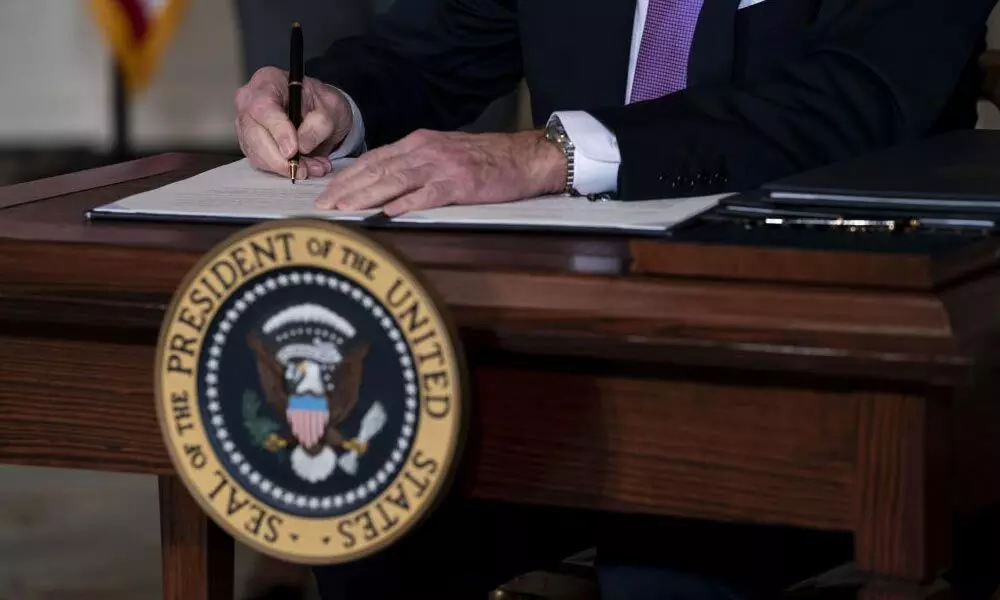Trump judges won't be Biden's biggest legal hurdle
If Biden’s agencies cut analytic corners or seem to be driven by politics, advocacy groups or abstract values rather than evidence and numbers, they might find themselves losing in court. For efforts to protect health and safety and to combat pollution, that’s a serious warning
image for illustrative purpose

IT is already clear that President Joe Biden will be implementing a large number of his policies through executive action.
The reason is equally obvious: Democrats control both houses of Congress, but with a 50-50 split in the Senate and thin majority in the House of Representatives, it will be challenging to enact ambitious legislation. Whether the issue involves climate change, Covid-19, occupational safety or civil rights, executive action might be the only game in town.
Regulations are a primary vehicle for executive action, and they are often challenged in court. The federal judiciary now includes more than 200 judges chosen by former President Donald Trump. Won't they be eager to strike down a lot of Biden's regulations?
It's a fair question, but for the Biden administration, it's less constructive to ask it than to take account of identifiable judge-made principles that regulators must respect. In recent years, the Supreme Court has issued two rulings that loom particularly large, and that could turn out to impose serious obstacles.
The first of those rulings - a big setback for President Barack Obama - emphasizes the importance of cost-benefit analysis. The second - a big setback for Trump - underlines the need for agencies to give careful consideration to how disruptive a regulatory change might be to people who relied on the previous rules and requirements.
In Michigan v. EPA, decided in 2015, the court was confronted with a regulation from Obama's Environmental Protection Agency, meant to regulate mercury from power plants. In listing mercury as a hazardous air pollutant suitable for regulation, the EPA considered the benefits of that regulation, but not the cost.
The Supreme Court struck its decision down. Its central conclusion was that it was unreasonable, and therefore unlawful, to look at just one side of the ledger - to take account of the benefits of regulation without also taking account of the costs.
For those hoping to challenge Biden's executive actions, that's a valuable precedent. Whenever an agency is permitted by law to consider costs, yet fails to do so, its decision will be invalidated.
Just considering costs might not be enough. If the benefits of a regulation are low and if its costs are high, courts might strike it down. As the Supreme Court put it in the Michigan case, "One would not say that it is even rational, never mind 'appropriate,' to impose billions of dollars in economic costs in return for a few dollars in health or environmental benefits."
If Biden's agencies cut analytic corners or seem to be driven by politics, advocacy groups or abstract values rather than evidence and numbers, they might find themselves losing in court. For efforts to protect health and safety and to combat pollution, that's a serious warning.
In Department of Homeland Security v. Regents of the University of California, the Supreme Court struck down the Trump administration's effort to revoke Obama's immigration-relief program, Deferred Action for Childhood Arrivals. The DACA order allowed unauthorized noncitizens who came to the U.S. as children to apply for a two-year period of forbearance from deportation.
The court noted that DACA recipients have "enrolled in degree programs, embarked on careers, started businesses, purchased homes, and even married and had children, all in reliance" on the program. Yet the Department of Homeland Security failed "to assess whether there were reliance interests, determine whether they were significant, and weigh any such interests against competing policy concerns."
The idea is that whenever regulators change the status quo, they will have to give careful consideration to "reliance interests" - to whether and how individuals and companies might have spent money or changed their behavior in reliance on what a previous administration did.
That might turn out to be a challenge for the Biden administration. If Biden's regulators depart from Trump's approach, as they are already doing, it will be necessary for them to acknowledge any reliance interests and to explain that they have good reasons for overriding them.
There is a larger point here, and whatever your politics, you might find it inspiring.
Over a period of decades, federal judges, appointed by both Democratic and Republican presidents, have built up a set of principles to restrict the power of executive agencies - by, for example, requiring careful consideration of alternatives, detailed attention to public comments and persuasive explanations for their decisions. These principles can easily be seen to be part and parcel of the rule of law.
They created a lot of trouble for the Trump administration, which had an abysmal record in court.
Trump and his supporters tended to blame these losses on "Democrat judges," but that's too simple and mostly wrong. And while Trump appointees will almost certainly prove to be a special challenge for Biden, it would be too simple and mostly wrong to say that any losses would be because of "Republican judges."
Both Republican and Democratic judges have policed arbitrariness from the executive branch - sometimes by requiring consideration of regulatory costs, sometimes by emphasizing the need to consider reliance interests and always by requiring agencies to offer reasoned justifications for their choices.
Biden's regulators would be wise to respect those requirements. (Bloomberg)

